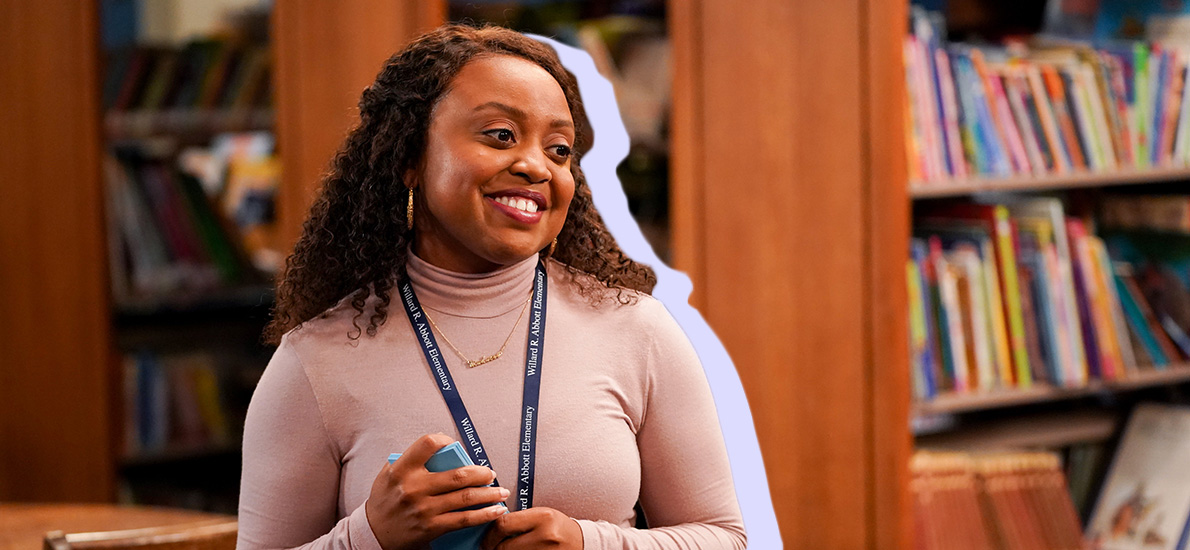When I think of my favorite television shows, most of them consist of over-dramatic, super-produced reality television. However, in the last few years I’ve been yearning for a show that isn’t over-the-top dramatic, something that I can relate to as a young Black person trying to figure this life shit out. ABC’s Abbott Elementary is what I’ve been waiting for. The series stars Quinta Brunson as Janine Teagues, a passionate, fairly new second-grade teacher who wants the best for her students, and is trying to figure out how she wants to approach her teaching career. Most of us know Brunson from her hilarious skits and her work with Buzzfeed (the iconic “he got money” meme), so of course, I was excited to watch Abbott Elementary. The show is the perfect example of representation done right and how you can have representation for Black people on TV without the exploitation of Black trauma.
I was drawn to Abbott Elementary because I love a good mockumentary. Shows like The Office, Parks and Rec, and Modern Family are my go-to comfort shows, however, I’ve never been able to really relate to any of them. Yes, there are Black characters on all three of those shows, but those characters are usually on the sidelines and aren’t given the proper screentime in order for us to get to know them. On top of that, the dialogue they were given was usually embedded in stereotypes, like Donna from Parks and Rec being the token “sassy Black woman”. Now, one could argue that representation in any capacity should be celebrated and that Black people are not monolithic; therefore, there isn’t any “correct” way to showcase Black people on TV. While there is truth to that, representation goes beyond just putting a Black person in a group of white people—doing that is just performative. It is also not just talent on screen that matters, but off-screen as well. When Black talent does not have anyone that looks like them behind the scenes, their characters and storylines aren’t given the love and attention that they deserve, and I notice one or two things that usually occur. One, either the Black character(s) are only surrounded by white people and are the butt of a lot of cringe race jokes (Stanley from The Office; Angela from Boy Meets World). Or two, the Black talent is forced to become the sounding board for white guilt and is presumed a “history teacher” to their white colleagues (Eboni K. Williams from The Real Housewives of New York City). That’s why watching Abbott Elementary is so refreshing. Not only do we have a predominantly Black cast, but there’s representation across the board, from the hair and makeup team to the production design.
In addition to the representation in front of and behind the camera, Abbott Elementary also does a good job of showcasing Black people on television simply existing. When I say existing, that does not mean that I expect to watch a show with a predominantly Black cast and not address some of the adversities that we as Black people endure; it’s simply not possible. But, I like the fact the show doesn’t feel heavy while still making me feel seen as a Black person. Sometimes, when I see a predominantly Black cast on television or in movies, there’s always a factor of Black trauma that is showcased, which can be incredibly triggering. Obviously, the struggles that we as Black people face solely because of our existence should be talked about, but I don’t want to always have to relive those experiences constantly, especially when I’m chasing some form of escapism. What I appreciate about Abbott Elementary is that it humanizes the Black experience. Brunson’s character, Janine, faces confidence issues, relationship issues, and attempts to connect with some of her co-workers, which at times doesn’t work out. These are things that I have faced before, as have many of my peers. To be able to relate to Brunson’s character has made me realize the importance and impact that representation on television can have, all while still feeling safe in my viewing experience.
Abbott Elementary has everything you could ask for in a sitcom: humor, bubbling romance, and a great chemistry between the cast. There aren’t any characters that feel unnecessary or make you feel uncomfortable, and everyone on the cast contributes to the show’s success. I love that I can relate to this show in a way that isn’t based on Black trauma, but rather, on my experience as a young Black person trying to figure my life out. My hope is that not only will the show continue to be successful, but that it creates an avenue for other Black creators to create original content.
Images: ABC/Gilles Mingasson








































